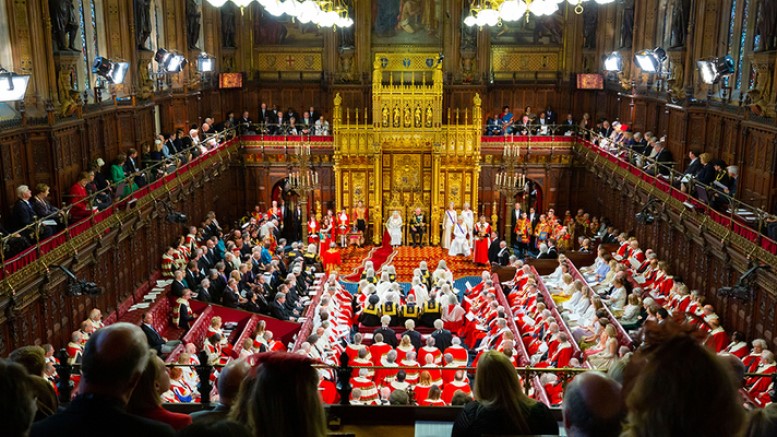
Following the Queen’s Speech on Monday 14 October, in which she laid out the Government’s proposals for the new Parliamentary session, Rail Insider’s mailbox started to fill up as various industry bodies gave their reaction.
But what had she said that got them so excited? To be honest, she said very little.
Having covered Brexit, fisheries, agriculture, trade, the economy, the National Health Service, adult care, violent crime and pensions, Her Majesty got to infrastructure.

She started off promisingly enough. “To ensure that the benefits of a prospering economy reach every corner of the United Kingdom, my Ministers will bring forward a National Infrastructure Strategy. This will set out a long-term vision to improve the nation’s digital, transport and energy infrastructure.
“New legislation will help accelerate the delivery of fast, reliable and secure broadband networks to millions of homes.
“An aviation bill will provide for the effective and efficient management of the United Kingdom’s airspace Air Traffic Management and Unmanned Aircraft Bill.
“Proposals on railway reform will be brought forward.”
And that was it. Eight words on Britain’s railways.
Hardly anything in fact.
So why did our inbox start filling up?

The answer lay not in the speech itself, but in its background briefing notes. In them, Prime Minister Boris Johnson also spoke about the infrastructure strategy. “We are going to turbo-charge our country with one of the greatest eras of infrastructure investment in everything from rail to roads to gigabit broadband,” he said. “We will enshrine our plans in a new National Infrastructure Strategy, modernise our airspace through legislation, and boost our space programme with a UK Space Strategy.”
So, the Prime Minister said even less than Her Majesty had.
Executive Summary
Rail does get a mention in the Executive Summary of the briefing notes. “Later this autumn, we will publish a white paper on the recommendations of the Williams Review; the first comprehensive review of railway in a generation. We will focus on reforms that put passengers at the heart of the railway, provide value for taxpayers and deliver economic, social and environmental benefits across Britain.”
Well, we knew that, Nothing new there.
Keep reading, and we finally get to the section on railways, on page 88 of the notes. Here it is in full:
- The Government will publish a White Paper on the Williams Review recommendations later this autumn.
- Following the publication of the White Paper, the Government will start implementing reforms from 2020, prioritising improvements for passengers.
- In September, the Prime Minister announced plans to give Northern leaders more of a say on how the railway is run across the region. This proposal was based on the initial conclusions of the Williams review set out in July.
- The Williams Review is the first comprehensive review of the railway in a generation, with a clear commitment from the Government to bring in root and branch change. The Review was tasked with making ambitious proposals to reform the rail industry and franchising model.
- The Review is focused on reforms that will put passengers at the heart of the railway, provide value for taxpayers and deliver economic, social and environmental benefits across Britain. It will focus on five key areas:
- Trains running on time. A clear focus on customer service excellence, driven by performance measures to bring about genuine behavioural and cultural change.
- Simplified fares and ticketing to create a modern railway to promote innovation and customer-focussed improvements across the network, including the further roll out of pay-as-you-go.
- A new industry structure, reducing fragmentation, better aligning track and train, creating clear accountability and a greater distance between Government and running the day to day railway.
- A new commercial model that lets train operators get on with running services in the interest of passengers and allows greater flexibility and long-term incentives for creativity and innovation.
- Proposals on leadership, skills, diversity and increased engagement, to better involve the rail workforce in the development of the sector in the long term, and to ensure the sector reflects modern working practices.
These are followed by some key facts, about how much the government is investing in the railways, how heavily used it is and how punctuality is a challenge. Again, nothing new.
Then on page 96, the notes talk about the High Speed Rail 2 (West Midlands – Crewe) Bill that was introduced in the House of Commons in July 2017. The details are reiterated, its length, its benefits, the need to purchase lad etc, and the comment is made that “a review led by Doug Oakervee is considering HS2’s benefits and impacts; affordability and efficiency; deliverability; and scope and phasing, including its relationship with Northern Powerhouse Rail.”
And that’s it. No commitment to see the Bill through the house, just “a review is considering…”
All in all, then, it was a pretty poor queen’s speech so far as the railway industry is concerned.
Reaction
But the ‘movers and shakers’ still had to make their comments – many of them predictable.

Darren Caplan, chief executive, Railway Industry Association: “It is encouraging to see the Government’s commitment to a National Infrastructure Strategy – RIA has been calling for a 30-year plan for the railways for some time.
“As far as our members are concerned, the rail supply sector requires a long term strategy for UK rail, which stops ‘boom and bust’ rail funding for infrastructure and rolling stock once and for all, and which provides consistency and visibility of upcoming enhancements work.
“Getting this right will allow rail business to deliver much more effectively the improvements expected by passengers and freight, whilst also creating and sustaining high value jobs and growing exports in these uncertain times.”

Darren Shirley, chief executive of Campaign for Better Transport: “Passengers have borne the brunt of the failures of the rail network for too long, so the recommendations from the Williams Review, particularly around local devolution and fares reform, must be swiftly brought forward and lead to enduring improvements across the railway and for the country as a whole.
“The Government can make one swift change in advance of the White Paper that will benefit passengers immediately: it should commit to dropping the RPI fare rise due in January 2020. It has a matter of weeks to ensure this increase doesn’t go ahead, further exasperating passengers.”

Paul Plummer, chief executive of the Rail Delivery Group: “The industry welcomes the government’s firm commitment to take forward the recommendations of the Williams Review, particularly its focus on fares and contract reform. Both are key to a new partnership between the public and private sectors in rail that delivers more for passengers and the country.
“We agree that decisions about trains should be brought closer to home and are pleased government plans to reform the regulations that underpin fares to enable greater local control.”

Mick Cash, general secretary of the RMT union: “As we suspected all we are getting is the current failed rail franchising model re-packaged and re-branded. It’s the same old ‘commercial model’ and the Tory principle that profits and privatisation come first remains locked in. Nobody will be fooled by this “same meat, different gravy” pre-election stunt from Boris Johnson and the Tories.
“Private operation of our railways in incompatible with reliable and high-quality services, lower fares and investment in infra-structure as the train companies will always suck the life blood out of the system in profits and dividends.”
So there we are. A Queen’s Speech that said precious little about the railways, briefing notes that said the Williams Review is due to report and will trigger a White Paper, the Oakervee report on HS2 is underway, and there has been a Bill before Parliament since 2017 to take HS2 to Crewe.
Wow!
View the speech for yourself on YouTube:


Be the first to comment